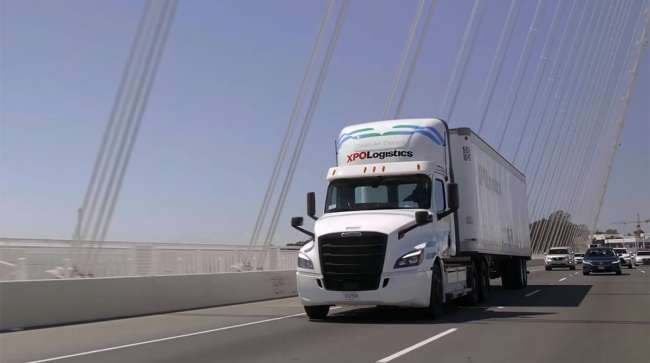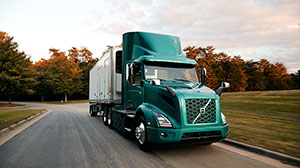Contributing Writer
XPO Begins Testing Electric Trucks

[Stay on top of transportation news: Get TTNews in your inbox.]
XPO Logistics is testing a Freightliner eCascadia in Oakland, Calif., the first step in what it expects is a lengthy transition from diesel-powered heavy-duty trucks.
The company will use an eCascadia, and later, a smaller Freightliner eM2, in a nine-month pilot program hauling cargo in the San Francisco Bay area.
“XPO will use this pilot to better understand how EVs will fit into our operations as part of our ongoing commitment to carbon reduction,” the company said in a May 5 statement.
Data generated by the program also will help Daimler Trucks North America hone the final design of its truck before launching commercial production late next year.
Large fleets are looking harder at how electric trucks will fit into their operations as states such as California and other regions globally push regulations to phase out diesel vehicles.
“As climate concerns continue to deepen among our partners, consumers and our communities, we see the imperative of investing in cleaner, more efficient solutions,” the company told Transport Topics. “We recognize that diesel will not be the industry’s long-term solution, so we are continuing to explore alternatives, such as lighter vehicles, smaller-format vehicles and emerging zero-carbon fuel options.”
With 7,800 tractors, XPO is one of the nation’s largest motor carriers. XPO ranks No. 2 on the Transport Topics Top 50 list of the largest logistics companies in North America and No. 3 on the Transport Topics Top 100 list of the largest for-hire carriers.
Let's see what this baby can do! As we head for an #electric future, our teams are piloting @DaimlerTrucksNA's new #eCascadia truck. Check out the full video: https://t.co/H9DXtUEQrc #sustainability pic.twitter.com/7mWIx2jZbe — XPO Logistics, Inc. (@XPOLogistics) May 5, 2021
Although it is deploying low-emissions technology, including about 300 liquefied natural gas and natural gas trucks in Europe, this is XPO’s first dive into electric trucking.
Hub Group also recently launched a six-month test in Southern California of the eCascadia that will look at how it fits in various freight environments and conditions in both dedicated and drayage freight operations.
“This test is an exciting next step in our innovation and sustainability journey,” said Phil Yeager, Hub Group president and chief operating officer, said in an April 23 statement. “It is part of Hub Group’s long-term strategy to bring to market innovation that has a meaningful impact on our customers’ businesses and reduce the supply chain’s impact on the environment.”
Other fleets testing the eCascadia include J.B. Hunt Transport Services Inc., Knight-Swift Transportation Holdings Inc., Ryder System Inc., Schneider National Inc., US Foods Inc. and UPS Inc.
Freightliner rival Volvo Trucks also is working with customers to roll out electric trucks.
It recently inked a deal to lease 14 Volvo VNR Electric trucks to Quality Custom Distribution, a national food service logistics supplier, for delivery routes in Southern California. Volvo will start to deliver the trucks to QCD’s distribution center in Fontana later this year. Additionally, Saia leased two electric VNRs from Volvo to use in Southern California.

Volvo VNR by Volvo Trucks North America
Analysts told TT that while electric trucking is gaining momentum, it still has only a small base. While it will grow rapidly in percentage terms over the next several years, the volume of electric truck sales will still be small compared to diesel truck sales, the analysts said.
“We’re seeing fleets in learning mode right now — figuring out operational parameters and how charging will work. I think once the fleets figure out pricing and operational costs and processes over the next 24 to 36 months, you will start to see fleets go faster on electrification,” Alastair Hayfield, senior research director at Interact Analysis, told TT.
By the time Daimler Trucks launches commercial production of the eCascadia late next year, market research firm IHS Markit expects new registrations of Class 8 battery-electric trucks in North America to top 1,000 units. But it won’t be until 2025 when new registrations of electric trucks by the major brands individually each will reach into the hundreds of units, IHS projects.
“The technology is moving forward with more momentum now than before,” said Andrej Divis, director of global heavy-duty truck research at IHS Markit. “We are now into the stage of gathering real-world understandings of the technology’s potentials and challenges, a necessary precondition for a broader rollout in the market.”
Want more news? Listen to today's daily briefing below or go here for more info:

